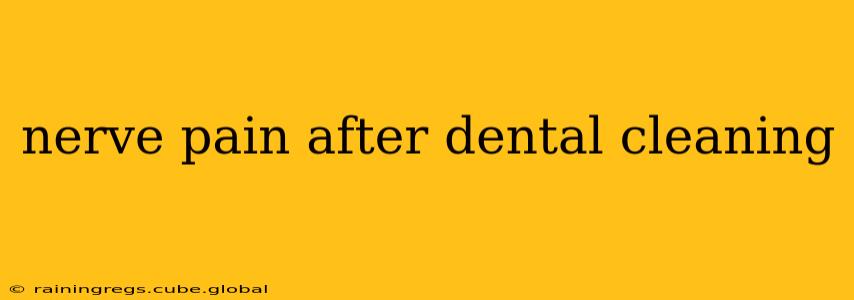Dental cleanings are essential for maintaining good oral health, but sometimes, they can lead to unexpected consequences like nerve pain. This discomfort can range from a mild tingling sensation to a sharp, shooting pain, significantly impacting your quality of life. Understanding the potential causes, effective treatments, and preventative measures is crucial for managing this issue.
What Causes Nerve Pain After a Dental Cleaning?
Several factors can contribute to nerve pain following a dental cleaning. The most common culprits include:
-
Irritation of the Trigeminal Nerve: The trigeminal nerve is responsible for sensation in the face, including the teeth, gums, and jaw. During a cleaning, particularly a deep cleaning, the instruments used might inadvertently irritate or put pressure on this nerve, triggering pain.
-
Inflammation: Aggressive cleaning or pre-existing gum inflammation (gingivitis or periodontitis) can exacerbate nerve sensitivity and lead to pain. The cleaning process itself, while beneficial, can temporarily increase inflammation in the surrounding tissues.
-
Injury to the Nerve: In rare cases, more serious nerve damage can occur during a dental cleaning, though this is uncommon with experienced professionals. This could involve direct trauma to the nerve or damage from instruments.
-
Referred Pain: Pain originating from other sources can sometimes manifest as seemingly unrelated dental pain. Conditions like temporomandibular joint (TMJ) disorders or sinus infections can cause referred pain that feels like nerve pain in the teeth or jaw.
-
Dry Socket (Alveolar Osteitis): While not directly related to nerve stimulation during cleaning, a dry socket can cause intense pain following tooth extraction (if one occurred during the cleaning). Dry sockets are characterized by the absence of a blood clot in the extraction socket.
What if the pain persists? Is it something serious?
Persistent nerve pain after a dental cleaning warrants a follow-up with your dentist. While often temporary, prolonged pain may indicate a more serious underlying issue such as nerve damage or an infection. Your dentist can assess the situation, perform necessary examinations, and recommend the appropriate course of action.
How is Nerve Pain After Dental Cleaning Treated?
Treatment options depend on the cause and severity of the pain. Common approaches include:
-
Over-the-Counter Pain Relief: Nonsteroidal anti-inflammatory drugs (NSAIDs) like ibuprofen or naproxen can help reduce inflammation and alleviate mild to moderate pain.
-
Prescription Medications: If over-the-counter medications are insufficient, your dentist may prescribe stronger pain relievers or muscle relaxants to manage the discomfort.
-
Corticosteroids: In cases of significant inflammation, corticosteroids may be prescribed to reduce swelling and pain.
-
Dental Nerve Block: In rare situations where the pain is severe and localized to a specific nerve, a dental nerve block might be administered to numb the affected area.
-
Referral to a Specialist: If the pain is persistent or unexplained, your dentist may recommend a referral to an oral surgeon, periodontist, or neurologist for further evaluation and treatment.
How long does nerve pain last after a dental cleaning?
The duration of nerve pain varies. In many cases, mild discomfort resolves within a few days. However, more significant pain might persist for several weeks. If pain persists beyond a reasonable timeframe, consult your dentist.
How Can I Prevent Nerve Pain After a Dental Cleaning?
While not all nerve pain is preventable, taking some precautions can minimize the risk:
-
Choose a Qualified Dentist: Selecting a dentist with experience and a good reputation is crucial. Experienced dentists are skilled in minimizing trauma during cleanings.
-
Communicate Your Concerns: Openly communicate any past dental sensitivities or concerns with your dentist before the cleaning. This allows them to adjust their technique accordingly.
-
Maintain Good Oral Hygiene: Practicing consistent and thorough oral hygiene, including brushing and flossing, helps prevent gum inflammation and reduces the likelihood of complications.
-
Inform Your Dentist About Medications: Inform your dentist of any medications you’re taking, especially those that can affect blood clotting or increase sensitivity.
This information is for general knowledge and does not constitute medical advice. Always consult with your dentist or healthcare provider for any concerns regarding your dental health or pain management. They can provide personalized recommendations based on your specific situation.
